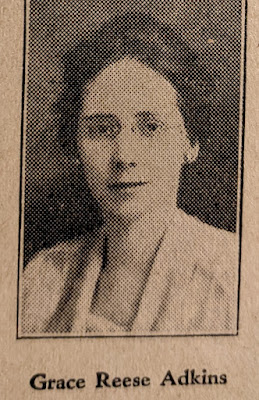Leaves from Childhood’s Diary, Part 1
Grace Reese, born in 1884, spent the first eighteen years of her life in Mondovi, Wisconsin, a town with 503 residents in 1890 and 1,207 in 1900. It is in Buffalo County, which shares a border with Minnesota, about 100 miles southeast of Minneapolis and 20 or so miles southwest of Eau Claire.
 |
| Photo Published in the Christian Standard, June 4, 1921 |
Grace was a precocious child (“Before I started to school I had learned to read, though no one knew how or when”). As a teenager, she enjoyed writing poems and songs, and she kept a diary, which she took with her when she moved in 1902 to Washington County, Arkansas with her father and eight siblings. (The move came soon after her mother passed away.) Thirty-five years later, Grace Reese Adkins (she married Ary Adkins in 1909) consulted her diary to recall important aspects of her Mondovi childhood. The memories were written as poems published in 1937 in the Fayetteville Daily Democrat. In one poem she remembered her bedroom in Mondovi.
My Room (Published May 6, 1937)Overlooking the river
And the alder slough.
I liked to sit at the window
In April dark
And listen to the frogs sing.
I had a dry goods box desk
In the corner
Draped with bleached and embroidered
Flour sacks.
Hidden in the desk
Was a cigar box
Containing my first poems –
Effusions about spring
Such as are still being
Written.
Above the desk was a shelf
With a few battered books
And an early edition of Riley
Which my uncle sent me from college.
The window curtains
Were made from a dress
Of my great-aunt’s.
But mother said
I must not explain that
To anyone.
The river mentioned in this poem was the meandering Buffalo River, which forms the southern border of Buffalo County. This river is fed by a couple of creeks that flow south through the county, and its shifting channel has over the years left behind several sloughs. The river, the two creeks that flow into it, and the sloughs created a habitat for diverse flora and birds that inspired many of Mrs. Adkins's poems.
Grace Reese shared her house with two older sisters and seven younger siblings, four boys and three girls. The house had a big front yard that, she reports, was a popular place for the youngsters and neighborhood kids to play games. She recalled the yard in this poem:
Our Front Yard (Published April 21, 1937)
It was the gathering place
For all the neighbors’ children.
Box elders managed to grow
Around it
And morning glories
At the windows,
But the grass
Had a hard time.
For there were games to play
Pom pom pull away,
Pussy wants a corner,
One ole cat,
And town ball.
Sometimes the windows got broken
And dad sent the neighbor children
Home.
But it was a great life.
The Adkins kids and the neighborhood kids played games with names that we no longer recognize: pom pom pull away, pussy wants a corner, and one ole cat. I can guess what “town ball” was. Probably that game was the one that most often resulted in a broken window.
The man who edited the column in which Mrs. Adkins's poems appeared also grew up in Wisconsin. His name was Walter J. Lemke and he was just a few years younger than Grace Reese, born in 1891 in Wausau. He had moved to Fayetteville in 1928 to start a journalism program at the University of Arkansas, and his column “Ozark Moon” was one of his many extracurricular journalistic activities. His column appeared in the Fayetteville Daily Democrat starting in January 1935, and he had issued an open call to his readers to send him their poems.
 |
| Fayetteville Daily Democrat, Jan. 1, 1935 |
No comments:
Post a Comment